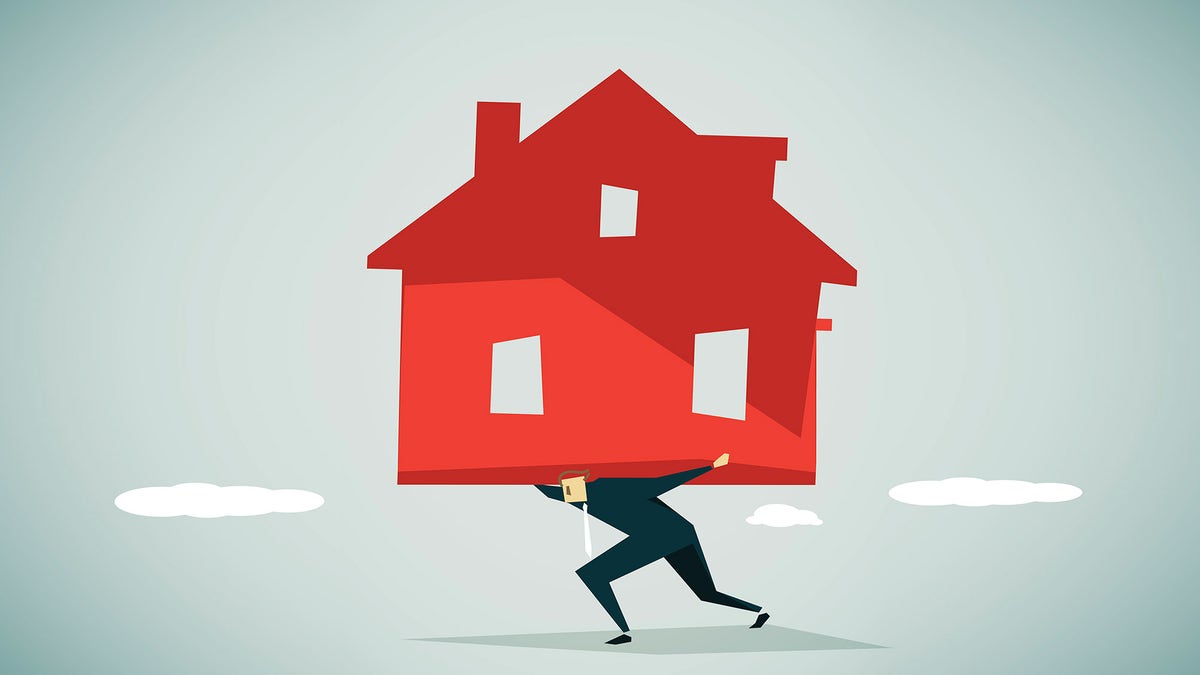
big heavy house
In the past 40 years, the average size of the American home has increased almost 1,000 square feet. True, it's lovely to have all that extra room to stretch out, but living in a vast space can have some significant drawbacks -- and we don't just mean the cost of your utility bill when you're putting on a sprawling, "Star Wars" -- themed holiday light display.
"We think more square footage will make us happier, but that's 100% not true," says Brett Graff, aka "The Home Economist" and author of " Not Buying It: Stop Overspending and Start Raising Happier, Healthier, More Successful Kids." While sprawling rec rooms and walk-in closets are certainly nice, they can actually undermine your family's happiness.
Here's why bigger isn't always better.
Reason No. 1: More room can mean less time with your kids
Big homes have plenty of kid-centric areas: media rooms where they can play Diablo 3: Ultimate Evil to their hearts' content, playrooms where toys can be left unattended without anyone having to step over them to get to the bathroom. You can't dispute the fun and convenience of either, but there's something to be said for having your kids in closer quarters, says Graff. The simple truth: If every family member has his or her own private space, you're depriving your family of chances to interact.
"The more opportunity your family has to communicate, the more they will," Graff points out. "Real bonding moments happen in hallways or around the kitchen island."
Plus, in a large home, you may have no idea what your kids are watching on TV, Googling on their laptops, or posting on Snapchat. This isn't about being a helicopter parent, but looking for teachable real-life moments -- rather than leaving your kids to figure everything out on their own in a separate wing of your residence.
Reason No. 2: You could derail your relationship with your partner
When your home has an outsize amount of square footage, it's quite conceivable that you and your partner won't see each other as much. But an even bigger worry could be how much you're paying to put that extra space between you.
"One of the most stressful issues couples struggle with is finances," explains Paul Hokemeyer, a licensed marriage and family therapist in Los Angeles, New York, and Telluride, CO. "By far, the place couples find themselves most overextended is in their home. Why settle for two bathrooms when they can have five?"
And once the house bills start stacking up, tensions rise and intimacy suffers. Big time.
Hokemeyer points out that while plenty of clients will attest that a shared experience -- like a road trip or vacation -- help them feel closer to their partner, "I've never once heard someone say that having five bathrooms made their marriage great."
Reason No. 3: Your commute probably sucks
Larger homes are typically found in the suburbs, which often translates into a long commute. Whether you're spending two hours on a train or just under an hour on the turnpike, chances are that the experience is taking a toll on your mood.
"Commuters have higher levels of cortisol, which is the stress hormone," explains Graff. Commute more than 10 miles, and you're likely to have high blood pressure. You're also at higher risk of obesity, probably because you have less time to sleep, cook, eat well, and work out. Studies also correlate long commutes with loneliness, not to mention increased divorce rates.
Reason No. 4: Neighbors? What neighbors?
Today, one-third of Americans say they don't know their neighbors. So much for borrowing a cup of sugar (did people really do this?). The thing is, sprawling square footage keeps families inside their own house and backyard, rather than chatting on the sidewalk with people who live nearby, fostering a sense of community. When you live in a larger home, you're more cocooned in your own personal space and far less likely to reach out to others, explains Sarah Susanska, a Minneapolis-based architect and author of " The Not So Big House" series.
People who know and trust their neighbors have better health -- including a lower risk of stroke. Social support from your community can also serve as a buffer when adversity strikes.
Reason No. 5: You might never feel 'at home'
Susanska remembers when one of her clients, a busy attorney with a hectic schedule, decided to build a house with an enormous greenhouse. When Susanska asked, "When are you going to get to use this?" the attorney burst into tears. "She realized that she was literally trying to build herself some free time," Susanska says.
She's seen similar situations play out with many other clients over the years. "I've seen people with gargantuan houses who are deeply unhappy. They try to build a dream, not a house that really fits in with their lives," she says.
The result? Not feeling at home in your house, or even in your own skin, says Susanska.
Granted, there is no "right" size of house. Big and small are, after all, relative terms. To find the house that's best for you, consider a home where every room sees daily use, says Susanska. You want to live in a house that suits your real life, she adds, "not your imagined life."
-- -- -- -- --
More from realtor.com: The Features That Help a Home Sell Fastest